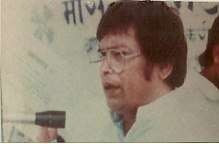Dalit Panthers
The Dalit Panthers are a social organisation that seeks to combat caste discrimination. The organisation was founded by Namdeo Dhasal and J. V. Pawar on 29 May 1972 in the Indian state of Maharashtra.[2][3] The movement's heyday lasted from the 1970s through the 1980s, and it was later joined by many Dalit-Buddhist activists.
Dalit Panthers | |
|---|---|
 | |
| Founder | Namdeo Dhasal J. V. Pawar Raja Dhale |
| Founded | 29 May 1972 [1] |
| Ideology | Dalit socialism Anti-casteism |
History
The Dalit Panthers were inspired by the Black Panther Party, a socialist movement that sought to combat racial discrimination against African-Americans, during the Civil Rights Movement in the United States, which occurred in the mid-20th century. The initiative to form the Dalit Panther movement was taken up by Namdeo Dhasal, J. V. Pawar, Raja Dhale and Arun Kamble in Bombay.[4] They conceived of the movement as a radical departure from earlier Dalit movements, due to its initial emphasis on militancy and revolutionary attitudes, akin to attitudes espoused by their Black American counterparts.
The Black Panther Party acknowledged and supported the Dalit Panthers through the Black Panther newspaper, which circulated worldwide on a weekly basis from 1967-1980..

Most of the organization's members were young men, some of whom were Neo-Buddhists. Most of the leaders were literary figures whose academic qualifications ranged from not having a basic education to master's degrees. The controversy over Raja Dhale's article titled "Kala Swatantrya Din" (Black Independence Day), published in Sadhana, the Dalit Panthers' official publication, on 15 August 1972, created a great sensation and built recognition for the Dalit Panthers through Maharashtra. The Panthers' support of Dhale during this controversy brought him into the movement and made him a prominent leader.[5] The leadership split after disagreements over its future and over if other castes should be allowed to join. The name Dalit Panther was taken up by others in many parts of Maharashtra as well as in other states, such as Tamil Nadu and Karnataka.
The Dalit Panthers emerged to fill the vacuum created in Dalit politics resulting from B.R. Ambedkar's Republican Party of India splitting into factions. The Dalit Panthers led a renaissance in Marathi literature and art. They advocated for and practised radical politics, fusing the ideologies of Ambedkar, Jyotirao Phule and Karl Marx. Crucially, the Dalit Panthers helped invigorate the use of the term Dalit to refer to lower-caste communities. Their manifesto, issued in 1973, fit the Ambedkarite spirit into a broader Marxist framework and heralded the rise of an autonomous Dalit perspective in post-Independence India.[6]
References
- Rajawat, p. 325
- Rajawat, Mamta (2004). Encyclopaedia of Dalits in India, Volume 1. Anmol Publications. p. 325. ISBN 978-81-261-2084-0.
- Michael, S. M. (2007). Dalits in modern India: vision and values. SAGE. p. 173. ISBN 978-0-7619-3571-1. Retrieved 9 January 2010.
- "Dalit Panthers: Another View". Economic and Political Weekly. 9 (18): 715–716. 1974. ISSN 0012-9976. JSTOR 41497050.
- "The last Panther". mid-day. 21 July 2019. Retrieved 8 August 2019.
- Satyanarayana and Tharu (2013). The Exercise of Freedom: An Introduction to Dalit Writing. New Delhi: Navayana. p. 55. ISBN 978-8-18905-961-3.
Further reading
- Contursi, Janet A. (1993). Political Theology: Text and Practice in a Dalit Panther Community, The Journal of Asian Studies 52 (2), 320-339 – via JSTOR (subscription required)
- Murugkar, Lata (1991). Dalit Panther Movement in Maharashtra: A Sociological Appraisal, South Asia Books. ISBN 0-86132-246-0.
- Sebastian, M. (1994). Liberating the Caged Dalit Panther, Emerald Publishers
- Mody, Navroz (Jan. 19, 1974). Atrocities on Dalit Panthers, Economic and Political Weekly, 9, (3), 44 – via JSTOR (subscription required)